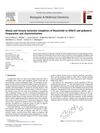 39 citations,
January 2012 in “Indian Dermatology Online Journal”
39 citations,
January 2012 in “Indian Dermatology Online Journal” Finasteride may cause sexual side effects like erectile dysfunction, but they are reversible and affect less than 2% of men.
 38 citations,
June 2003 in “Journal of Investigative Dermatology Symposium Proceedings”
38 citations,
June 2003 in “Journal of Investigative Dermatology Symposium Proceedings” Finasteride effectively improves hair growth and slows hair loss in men with male pattern baldness.
 37 citations,
April 2009 in “Bioorganic & Medicinal Chemistry”
37 citations,
April 2009 in “Bioorganic & Medicinal Chemistry” Finasteride complexes with HPβCD and polymers improve solubility, potentially enhancing hair loss treatment.
 37 citations,
September 2007 in “International Journal of Pharmaceutics”
37 citations,
September 2007 in “International Journal of Pharmaceutics” PPCM microspheres allow controlled finasteride release over 24 hours.
 37 citations,
November 1995 in “Journal of Investigative Dermatology”
37 citations,
November 1995 in “Journal of Investigative Dermatology” Topical finasteride and flutamide reduce gland size and enzyme activity, with flutamide being more potent, potentially treating acne, seborrhea, hirsutism, and androgenic alopecia.
 35 citations,
April 2013 in “Sexual medicine reviews”
35 citations,
April 2013 in “Sexual medicine reviews” 5-alpha reductase inhibitors slightly increase the risk of sexual and mood side effects, and breast growth in men.
 34 citations,
August 2011 in “Journal of Natural Medicines”
34 citations,
August 2011 in “Journal of Natural Medicines” Puerariae Flos extract may help treat hair loss by blocking a hair loss-related enzyme and promoting hair growth.
 33 citations,
April 2015 in “Current Opinion in Endocrinology, Diabetes and Obesity”
33 citations,
April 2015 in “Current Opinion in Endocrinology, Diabetes and Obesity” 5α reductase inhibitors treat hair loss but may cause sexual side effects and risks.
 33 citations,
May 2013 in “Andrologia”
33 citations,
May 2013 in “Andrologia” Some herbs show promise as antiandrogenic agents.
 33 citations,
November 2008 in “European Journal of Pharmaceutical Sciences”
33 citations,
November 2008 in “European Journal of Pharmaceutical Sciences” St. John's wort increases finasteride metabolism, reducing its effectiveness; use caution when combining them.
 33 citations,
January 1997 in “Endocrinology”
33 citations,
January 1997 in “Endocrinology” Testosterone can slow down hair growth when combined with certain cells from bald scalps, and this effect can be blocked by an androgen receptor blocker.
 33 citations,
October 1994 in “The Journal of Clinical Endocrinology and Metabolism”
33 citations,
October 1994 in “The Journal of Clinical Endocrinology and Metabolism” Finasteride reduces hair growth and is safe for women with excessive hair.
 32 citations,
May 2010 in “Pharmacopsychiatry”
32 citations,
May 2010 in “Pharmacopsychiatry” Finasteride reduces new brain cells in male mice, possibly causing depression.
 32 citations,
July 1999 in “Fertility and Sterility”
32 citations,
July 1999 in “Fertility and Sterility” Finasteride and flutamide both reduce hair growth, but finasteride has fewer side effects.
 31 citations,
January 1995 in “The American journal of medicine”
31 citations,
January 1995 in “The American journal of medicine” Testosterone and dihydrotestosterone play a role in women's health issues like excess hair and baldness, and treatments blocking these hormones may help.
 30 citations,
July 2001 in “BJUI”
30 citations,
July 2001 in “BJUI” Combination therapy improves urinary flow and reduces residual urine, but needs better stent design.
 29 citations,
September 2014 in “Current Opinion in Endocrinology, Diabetes and Obesity”
29 citations,
September 2014 in “Current Opinion in Endocrinology, Diabetes and Obesity” Finasteride and dutasteride effectively treat hair loss in men and women, but may cause side effects like low libido and depression.
 29 citations,
October 2011 in “British Journal of Dermatology”
29 citations,
October 2011 in “British Journal of Dermatology” Certain microRNAs are more common in balding areas and might be involved in male pattern baldness.
 29 citations,
February 2007 in “Hormone and metabolic research”
29 citations,
February 2007 in “Hormone and metabolic research” Blocking the androgen receptor in skin cells reduces their growth response to male hormones, suggesting a possible treatment for skin conditions linked to androgens.
 29 citations,
February 1996 in “Journal of Chromatography B: Biomedical Sciences and Applications”
29 citations,
February 1996 in “Journal of Chromatography B: Biomedical Sciences and Applications” New method detects finasteride in plasma quickly and accurately without clean-up.
 29 citations,
January 1996 in “Journal of Pharmaceutical Sciences”
29 citations,
January 1996 in “Journal of Pharmaceutical Sciences” Finasteride poorly inhibits type 1 5AR, affecting its effectiveness.
 29 citations,
April 1995 in “Endocrinology”
29 citations,
April 1995 in “Endocrinology” Finasteride doesn't affect bone density in male rats.
 28 citations,
December 2003 in “Medical Hypotheses”
28 citations,
December 2003 in “Medical Hypotheses” Ketoconazole shampoo with finasteride improves hair density in men with hair loss.
 28 citations,
January 1991 in “Reproductive Toxicology”
28 citations,
January 1991 in “Reproductive Toxicology” Finasteride temporarily lowers male rat fertility without affecting libido.
 27 citations,
August 2018 in “Therapeutic Delivery”
27 citations,
August 2018 in “Therapeutic Delivery” Nanotechnology could make hair loss treatments more effective and reduce side effects, but more research is needed before it's available.
 27 citations,
September 2017 in “Archives of Dermatological Research”
27 citations,
September 2017 in “Archives of Dermatological Research” Topical tofacitinib may grow hair better than minoxidil by increasing VEGF and reducing inflammation.
 27 citations,
July 2009 in “Experimental and Clinical Endocrinology & Diabetes”
27 citations,
July 2009 in “Experimental and Clinical Endocrinology & Diabetes” Finasteride safely reduces excessive hair growth in women.
 27 citations,
October 2001 in “Journal of Medicinal Chemistry”
27 citations,
October 2001 in “Journal of Medicinal Chemistry” Researchers found new potential but less potent rat enzyme inhibitors using a 3D model.
 27 citations,
January 2001 in “Endocrine Practice”
27 citations,
January 2001 in “Endocrine Practice” Finasteride cream reduces hair growth in women with hirsutism, but more research needed.
 27 citations,
November 1998 in “Journal of Endocrinological Investigation”
27 citations,
November 1998 in “Journal of Endocrinological Investigation” Finasteride significantly reduces hair growth in women with idiopathic hirsutism.






























